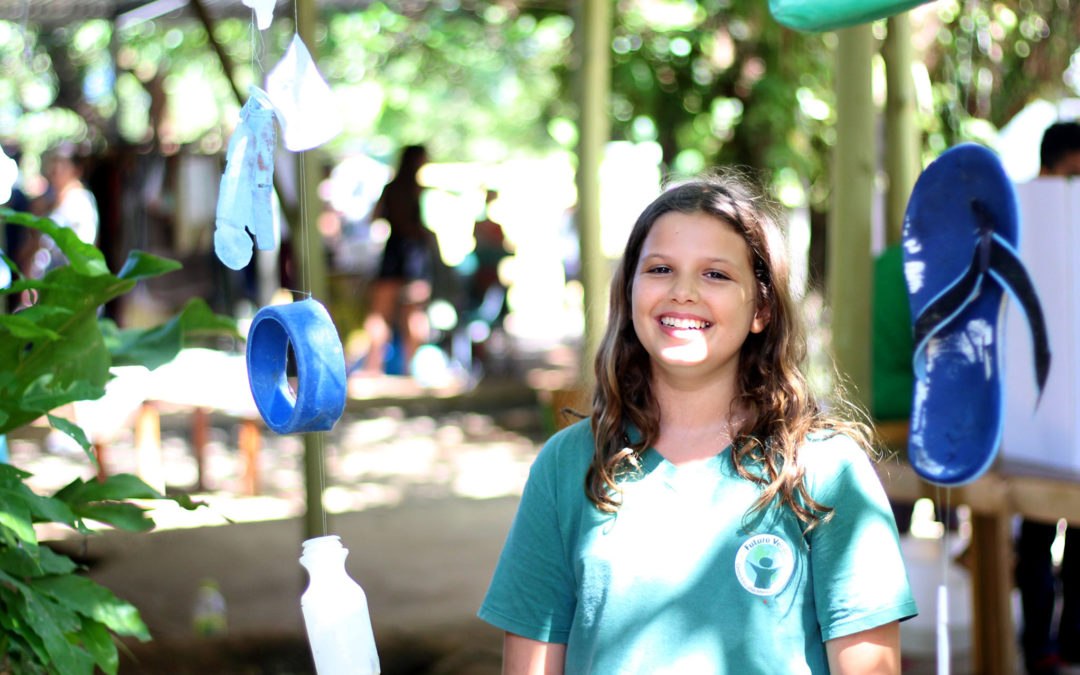
by Katie Chiaverini | Oct 24, 2018

Futuro Verde’s 2nd annual Sustainable Solutions Fair will be held on Friday, November 30th, but students are already hard at work. This year we are focusing on widening our sustainability topics and learning as a process which we will approach and evaluate in phases: inspiration, choice, design, and engage.
All of our students, grades pre-K through 11th, have begun the inspiration phase which includes investigating sustainability issues related to 5 specific categories: education and literacy, social justice and equality, health and nutrition, citizenship and responsibility, and environment and humanity. As they learn about sustainability issues around the world within these categories, we hope that they will be inspired to further investigate a specific topic. This will lead students into the choice phase where they will research about their chosen problem, looking at both global and local impacts. During the design phase, students will choose an innovative solution that addresses their chosen problem. On the day of the Sustainable Solutions Fair, the students will engage their audience to inspire change. Be ready to ask questions and learn more about sustainability issues and possible creative solutions!
We are celebrating the third anniversary of the Futuro Verde´s Green Fair. As part of the program of the Sustainable Solutions Fair, we provide a space for small businesses and entrepreneurs to exhibit and sell their products of great variety, from different food, desserts, clothing, crafts, paintings and much more. The Green Fair is a great opportunity to learn about local art and support entrepreneurs.
Vendor registration is now open to the public. Reserve your booth now!
This year the Sustainable Solutions Fair will also showcase the annual Trashion Show and Green Fair. Last year’s Trashion Show was such a success and so much fun that we decided it should be an annual event! The show featured ball gowns, samurai costumes, beach chic, futuristic fembots, and elegant cocktail dresses. These were made from such diverse trash materials as snack bags, cardboard tubs, magazines, markers, compact discs, e-waste, plastic bags, newspaper, cardboard pizza boxes, beach microplastics, plastic lanyards, and upcycled clothing.
This year, our Trashion show will be held in conjunction with our Sustainable Solutions Fair on November 30th, events with a shared mission and common themes. We look forward to welcoming our special panel of judges again. Participants will have the opportunity to win prizes for several categories in our Trashion Show: most elegant, best women’s attire, best men’s attire, best accessory (jewelry, bag, head/hair), most creative use of materials, most street worthy, and, of course, best in show.

On the day of the Sustainable Solutions Fair, you can expect food, gifts, workshops, art, science, music, presentations/talks, TRASHION, and a lot of FUN!
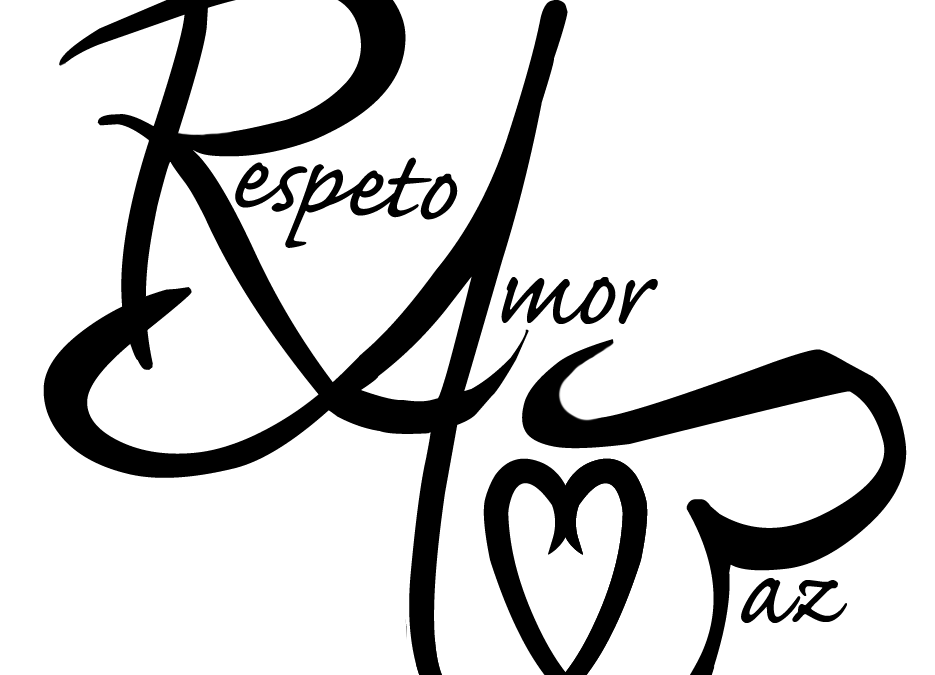
by Lural Ramirez | Oct 20, 2018
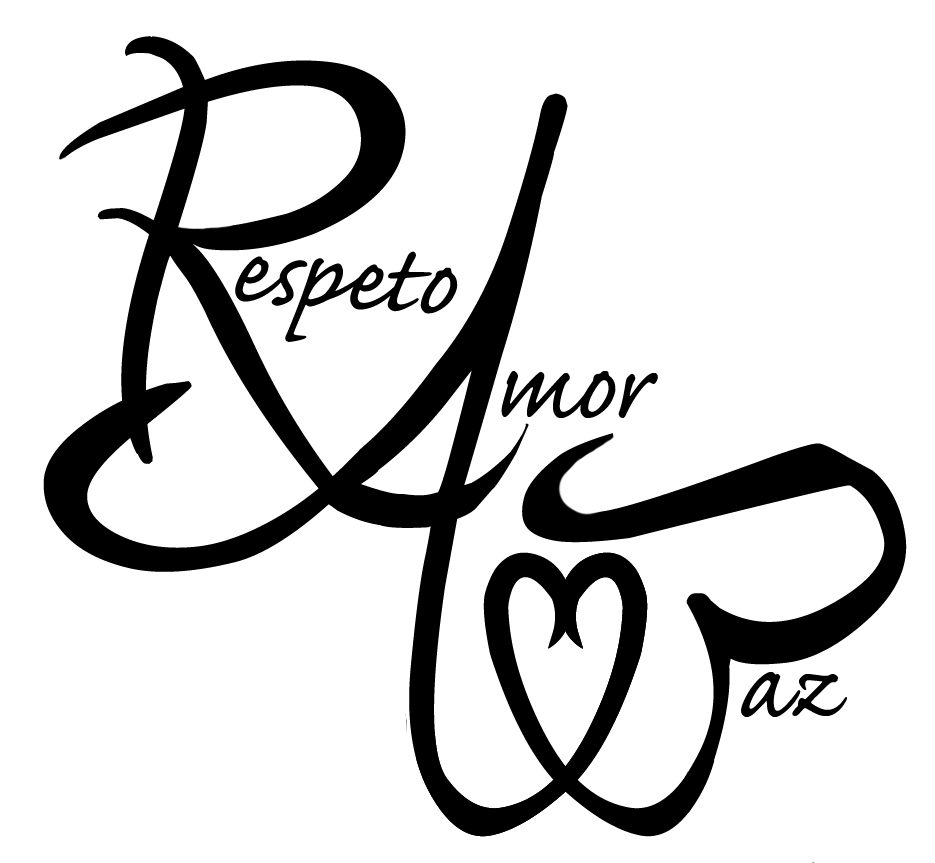
There are a number of events we hold at Futuro Verde each year – events to look forward to from year to year and events which highlight our unique school culture, our students’ talents and creativity and our focus on sustainability and critical thinking. Each December, as the school year comes to a close, we hold a beautiful whole school celebration called RAP: Respeto, Armonia y Paz. This event began in 2016 with the intention to bring together our diverse school population with a showcase of memorable dances, music, theatre presentations, lyrical poetry and much, much more!
This year’s event is scheduled for Friday, December 7th and will include the same quality of unforgettable performances plus some additional surprises not to be missed, including special presentations from two of our graduating classes- Prepa and 9th grade.
We ask parents to help us in two ways as we prepare for this fun-filled event:
- Please encourage your child to actively participate in the event!
- Please plan to attend the day’s event as an audience member by setting aside the date now in your social and work calendar!
Thank you and see you at RAP 2018 on Friday, December 7th!
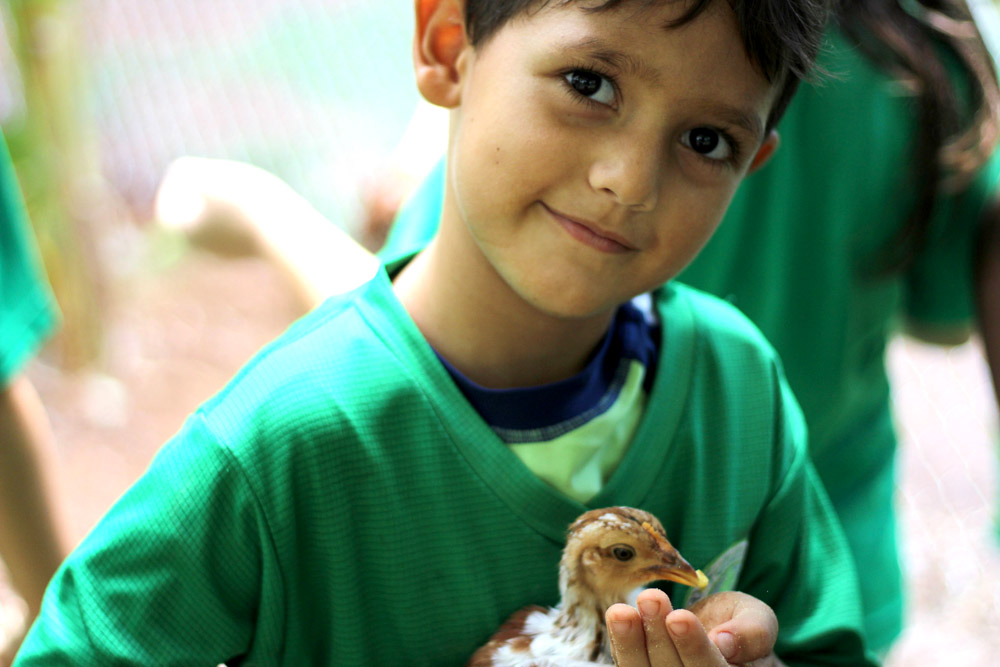
by Angie Briceño | Oct 19, 2018

Did you know that Futuro Verde receives support from people around the world and in different ways? Some make their donation only once to support a specific project, others are interested in annual campaigns and others, like the character of this article, donate monthly to support all the campaigns of the school.
We love to know a little more about the people who support us and follow our work from other places, that is why we gave ourselves the goal of knowing a little more about where they come from and what some of our donors are doing.
On this occasion, we had the pleasure of meeting Holly Scheuer, native from Texas who fell in love with the area of the Nicoya Peninsula, which is how she learned about Futuro Verde.
Holly is also a teacher in a school in Texas and that is why Futuro Verde has caught her attention. In our interview, Holly mentioned that what she liked the most about Futuro Verde is that students are not only learning, but that they are learning in a creative way and most importantly they are exposed to a constant social responsibility, which is what we need in our classes nowadays.
For Holly, as a teacher and as a citizen of the world, the most important thing that she believes that schools should be teaching children and young people is about our Earth, our world and how to take care of it, she told us how she believes that Futuro Verde is doing a great job achieving this goal, it is for this and for her belief that all children must be learning in the classroom that Holly gives support to Futuro Verde from afar.
We are confident that we will continue to collaborate with Holly or “Ardilla” as her students in Texas call her in the future.
Thanks to Holly and all our collaborators for making possible the dream of education!
If you would also like to collaborate, click here to find out your best way to help!
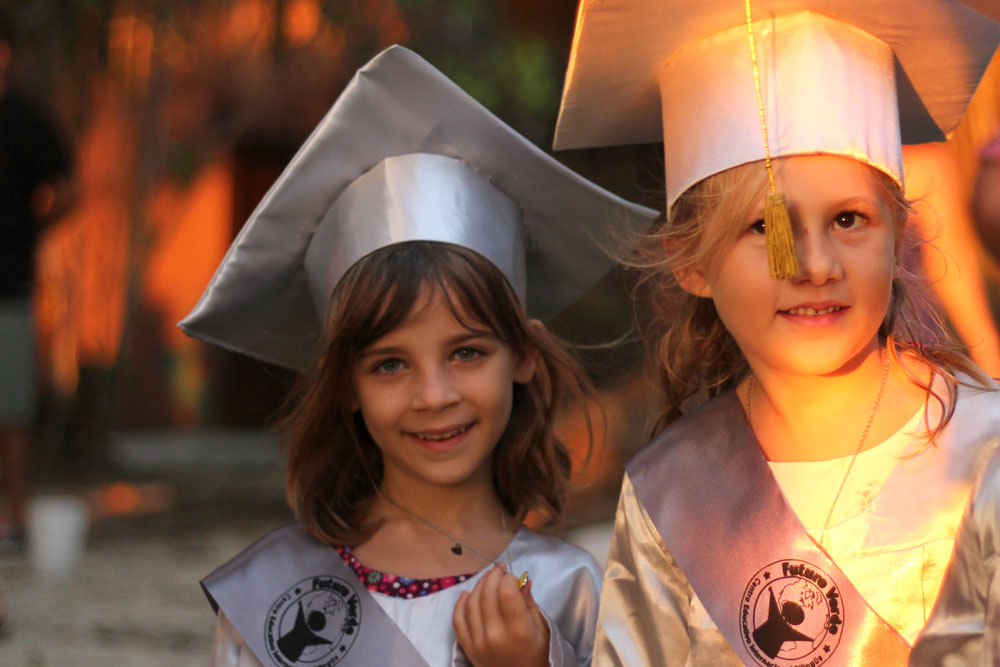
by Lural Ramirez | Sep 20, 2018

For the last few weeks Futuro Verde parents have had the opportunity to give their invaluable feedback to the Futuro Verde leadership team regarding different aspects of our school. Huge appreciation to all of our families who responded. We had a great turn-out, with respondents from all different cultural backgrounds, native languages, years with the school and with students from every grade level. We appreciate and value your feedback and will take to heart all of your suggestions and comments- Thank you!
Some of the survey results have guided important decisions we have been pondering as a staff. Today, I would like to specifically share with you the results regarding our structure for graduations.
Parents were asked to share their feedback on the level of event we hold for the different graduation levels (Prepa,6th, 9th and 12th grades). Well, the results are in and the survey shows that 56% of Futuro Verde parents prefer a change in the way we have traditionally done graduations. A group of leadership team members, teachers and parents will work to finalize details, but I can share with you today that we will be making the following changes to our graduation structure from this year on:
For Prepa and 9th grade, graduation acknowledgement will be integrated into our festivities during RAP each year. Prepa students will also hold a celebration in their classroom to acknowledge this important change of grade level.
For 6th grade, graduation will happen at Futuro Verde each year. We will hold the graduation on campus, with beautiful decorations and a formal ceremony. This ceremony will be held the second day of conferences as a late afternoon event. This year’s event will be held at 5:00 pm on Friday, December 14th.
There will be no high school graduation event this year, as our current 11th graders will become our first class of 12th graders in 2019. Next year, and from then on out, 12th graders will have an off-campus formal graduation ceremony that will incorporate both the IB and MEP diplomas earned at the end of 12th grade.
This new graduation structure reflects the wishes of a majority of our school community and we are excited to modify our structure in order to make it the most meaningful and appropriate for each graduating class. Again, thank you for your feedback and suggestions!
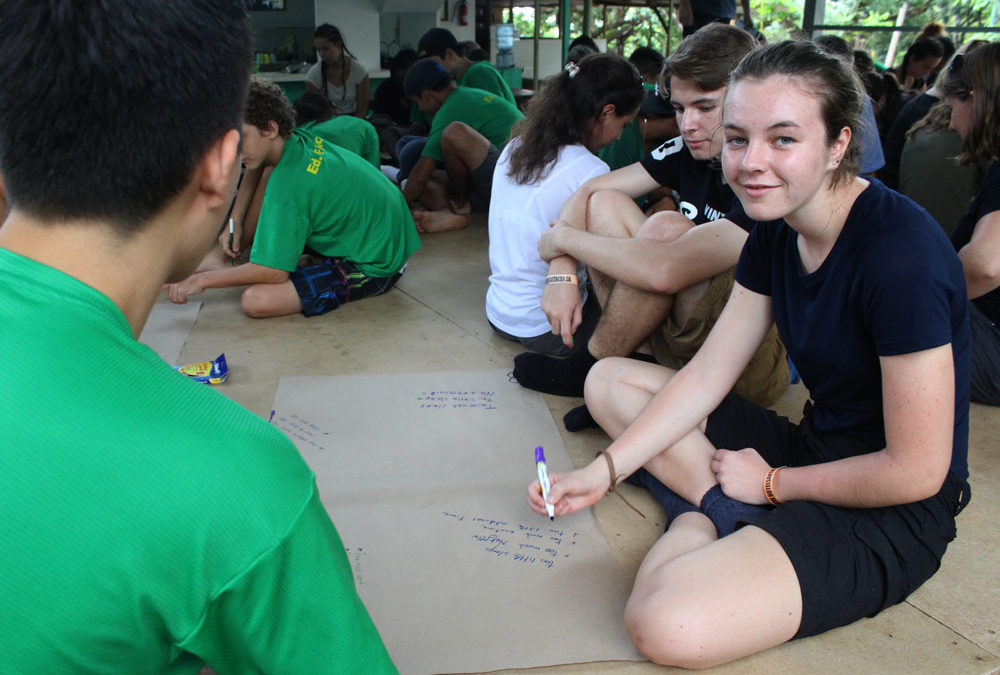
by Katie Chiaverini | Sep 11, 2018
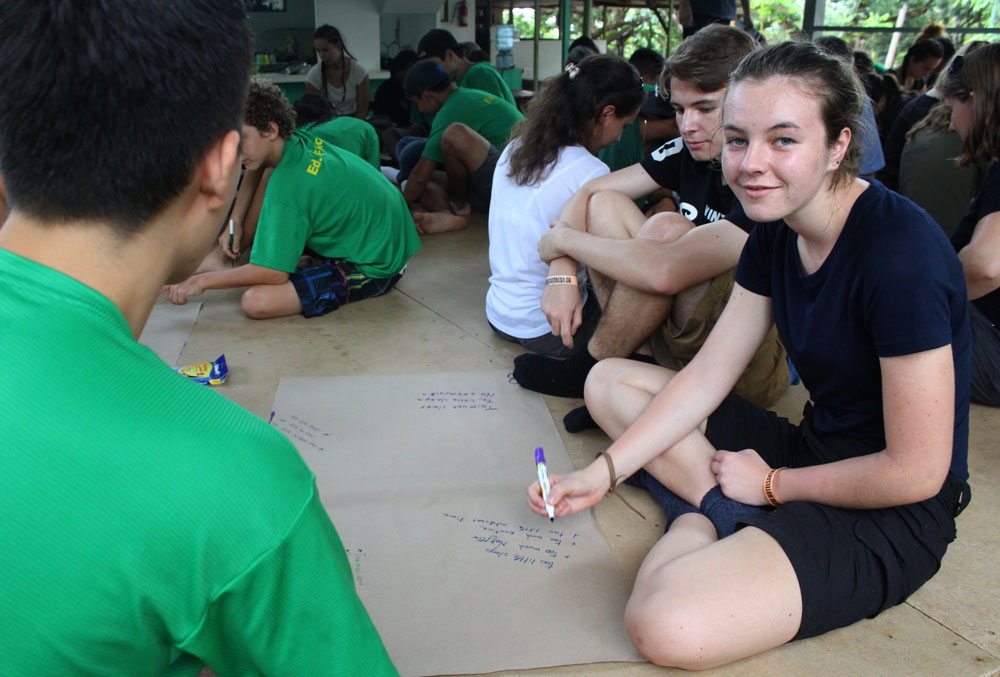
The week of October 21st Futuro Verde will give a big welcome to the International Baccalaureate students from Jersey Island, part of the Channel Islands. This group of 7 high school students attend Hautlieu School and participate in the IB Diploma Program. They take a trip to Costa Rica as part of the CAS (Creativity, Action, Service) program, an integral part of the International Baccalaureate Diploma Program. Their visit reaps benefits for all as it is a great opportunity for our students to make meaningful global connections with students from afar.
Futuro Verde IB students also participate in the CAS program, so this is a great opportunity for our student community to learn from other students’ experiences.
We are lucky to have this sustained cultural interaction which also helps further develop the CAS objectives, three in particular:
- explore new possibilities, embrace new challenges and adapt to
new roles
• purposely reflect on their experiences.
- understand they are members of local and global communities
with responsibilities towards each other and the environment.
Jersey students and Futuro Verde students collaborating is a perfect example of a global community coming together to take action towards a common goal. This is how it all starts…the Futuro Verde administration team works ahead of time through email and Skype to connect with lead teachers from the partner school. They identify specific needs for Futuro Verde and the student body at that time. The service project ideas stem from these needs. The Jersey Island students then have the opportunity to interact with FV students pre-K through Colegio to create solutions to the identified needs, which involves hands-on experiences as suggested by CAS.
Past projects have included a range of focus areas from environmental education to specific academic needs. For example, one year the students participated in a beach cleanup with the purpose of collecting plastic to create murals with Colegio students to beautify our campus and also collected items to use for math manipulatives for younger students. Usually students are divided into three groups to focus on three different projects to make the most of their time and offer more direct interactions with our students. We are excited to see what projects will take place this year to enrich our students’ lives and improve our school.
The Hautlieu school, now on their fourth year visiting our school stay in Costa Rica for several weeks volunteering on several service projects, including orphanage work, Only Love preschool, and other activities. The students are also able to enjoy the beautiful diversity of Costa Rica with leisure activities, like hiking and visiting various tourist destinations – allowing them to see different aspects of the country.
Reflection and personal growth are at the heart of the CAS program, which is very holistic in nature. In the past, teachers and administrators who have worked with Hautlieu students have noticed changes in perspective just within the time frame they spend at our school. One of the positive things they mention is the connections they see between Futuro Verde students and teachers, starting with our lunch arrangement where we all eat together and are able to build and strengthen relationships in this way. Futuro Verde students comment that it is always interesting to learn about someone else’s culture and how this impacts their perspective. This year’s visit with the Jersey Island students will be yet another opportunity to open our minds to a new experience and grow as individuals.

by David Brookshire, MPH/ School Counselor & Special Education Case Manager | Aug 30, 2018

Empathy is a complex skill that involves understanding another person’s perspective and responding appropriately. This skill grows to become the foundation of how we learn to interact with others in an effective way and can determine the quality of relationships we build throughout our lives. Needless to say, it’s important. We all want our children to grow up as caring, considerate, and understanding human beings. So, how can we help them become this? Here are a few tips for developing caring and empathetic children:
1. Model:
One of the best ways for children to learn anything is through modeling. Quite simply, when they observe someone modeling a particular behavior, they are much more likely to learn and repeat that behavior. Parents can model empathy by verbalizing their understandings of others’ feelings in various situations. For example, if your child is crying, you can say, “I see that you are crying. It seems like you are sad. Are you sad? I know it’s hard sometimes.” These few short sentences validate the child’s perspective and verbalize the connections between their thoughts, feelings, and behavior. Providing them an experience where someone shows them empathy helps them build those pathways in the brain. This is important to do for them and can also be demonstrated in situations involving others’ feelings.
2. Make connections through observation:
In any public or family situation, you can point out situations where a person is behaving in a certain way and ask your child if they have any guesses for why they might be doing what they are doing. For example, “Why do you think that man is yelling?” If he or she doesn’t know you can discuss different possibilities and connect it with how we act when we are feeling a certain way. Another way to practice this type of perspective taking is to apply this to any conflict the child might have. For example, if she hits her brother, you can ask her how she thinks her brother feels when she hits him. A follow up question would be, “How do you feel when your brother hits you?” This type of dialogue is great for empathetic brain development and a great way to practice the Golden Rule (Treat others the way you would like to be treated.). Practicing this type of perspective taking at home, in public, and even through literature by discussing the characters, can be a great way to make connections through observation in order to develop empathy skills.
3. Listening and vulnerability:
Through interactions, we learn and practice empathy. One of the best ways to do this is by being a good listener. Allowing others to fully express their perspective naturally helps us to understand this perspective. This, of course, requires us to express our perspective appropriately when it is our turn to do so. This requires vulnerability and honesty as we express how we are feeling. This is one of the best ways we can model and practice empathy with our children.
4. Unplug:
If building empathy skills requires interaction with others, it is absolutely essential that we limit electronic screen time for ourselves and our children. If most of our free time is spent staring at our respective screens, this obviously reduces that amount of time we are interacting with others. This is only the tip of the iceberg, however. Studies show that too much time on electronics for developing brains can cause such problems as irritability, insomnia, poor social skills, poor memory, difficulty focusing, poor eye contact, impulse control, and disorganized behavior. Dr. Victoria Dunckley explains in her book, Reset Your Child’s Brain, that a child’s brain that is overly engaged in electronic screen time creates imbalances in the brain by providing too much activity in the reward centers and too little activity in regions associated with empathy. By substituting screen time for family game time, a leisurely walk, conversation, or other activities, you can have a major impact in building connection, modeling social interaction, and strengthening brain development.
By incorporating these strategies, you are well on your way to developing caring and empathetic children.
















